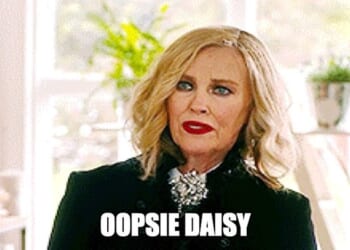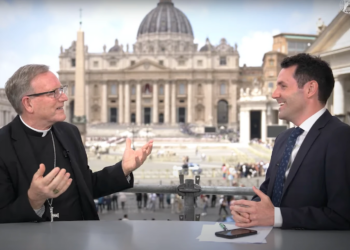Călin Georgescu, winner of Romania’s presidential election last November, was cancelled, then banned from running again. Now the regime faces a 38-year-old firebrand, George Simion, leader of a nationalist party, AUR — openly supported by Călin Georgescu in a powerful partnership. Challenging them is a Soros construct, Nicușor Dan, the mayor of Bucharest. The election will be held this Sunday and represents a national awakening. (RELATED: Stop the Steal in Romania: A Sinister Case)
Let me explain…
Twenty-two years ago, in early 2003, a Washington, D.C. neighbor — a think tank guy who taught at Yale and Georgetown — stopped by to say he was planning a research trip to Bucharest, Romania. Knowing I was born there, he asked: Would I come along to help with translation and getting around?
Considering he was delightful company, I agreed to join up, leaving my art gallery in an assistant’s hands. (His wife was a museum curator, and the three of us had bonded over long discussions about the arts.)
Once in Bucharest, I quickly saw my friend, General William Odom, in a new light. He was researching the country’s political leadership, ostensibly for a chapter about the ongoing post-Communist transition.
But considering his credentials — former director of the National Security Agency under President Ronald Reagan; Russia specialist for decades; decorated 3-star general — national politicians were sure he was a powerful emissary in disguise, so they were dying to meet him.
Any door he pointed to immediately opened. Every politician was eager to know what the United States needed, and they promised to deliver. They were especially eager to join NATO, which Odom helped deliver a year later.
I’m going back to that visit in my mind as we await results of this Sunday’s election because I think it explains a lot that Western media insists on ignoring.
Subservient Political Class
To understand the current political atmosphere in Romania, it’s crucial to have a sense of how utterly subservient to Western interests the country’s elite became in three phases: after Communism fell, after 9/11, and after Washington and NATO set their eyes on Ukraine as a target to pull into its orbit.
For about 35 years, Romania’s political class complied unconditionally with any requests from the West, rarely consulting its citizens.
Dramatically, last Nov. 24, Romanian voters rejected this chronic subservience and voted for Călin Georgescu, a #RomaniaFirst candidate. Shocked, the establishment cancelled the democratic process, just two days before the final round, rather than cope with an unwanted victor. (RELATED: Biden’s Last Gasp Subverted Romania’s Democracy)
Rejecting a political establishment in power for 35 years was a form of revelation. Georgescu used transcendent language around identity, nature, and ancestral traditions, which called forth new pride and a recommitment to the national project. It was so much more than a political campaign. (RELATED: Romania’s Trump Explained: Rejecting ‘Forever Wars’ and Woke Politics)
You can call sovereignist (their preferred descriptor) candidates “far-right” or “ultra nationalist” as Reuters, BBC, and the New York Times do, but Romanian voters are simply demanding that national priorities replace foreign agendas — a healthy response to a self-serving ruling class.
Picking Presidents
Returning to General Odom’s tour, I’ll recount an eye-opening moment.
We went to see the mayor of Bucharest, Traian Băsescu, a former sea captain and a favorite of the U.S. embassy. (The embassy was already engaged in a campaign to sabotage the leading presidential candidate, Prime Minister Adrian Năstase, to benefit Băsescu.)
An over-confident man overflowing with bravado, Băsescu assured Odom (in good English) that he could deliver exactly what the U.S. Embassy said it wanted: a national anti-corruption program benefiting U.S. products and services.
At one point, he pulled out polling commissioned by his rival, Năstase, and claimed the numbers showed he could beat Năstase in the upcoming election. (I was fixated on the fact that Băsescu obviously had moles in Năstase’s inner circle.)
It felt like Băsescu was selling a product — himself — to Odom
Alone at dinner, Odom told me he was not snowed by Băsescu’s big anti-corruption pitch: “He can say whatever he wants, Washington knows who he is,” the general cryptically reassured me, “and that makes him appealing.”
With U.S. government support, Băsescu became president in 2004 and, in 2009, won reelection.
He was an ethically disastrous leader: Friends and family — a brother, daughter, alleged mistress, and other close associates — were convicted of various serious corruption offenses. He was impeached, then saved when the infamous Constitutional Court ruled in his favor on a technicality.
But Băsescu was a gold star partner when it came to American military interests: He agreed to establish American military bases on the Black Sea in 2005 and signed a deal to host a U.S. missile system in 2011.
After he left office, it emerged that he never qualified to serve as president because he was an active member of the Communist secret political police (Securitate), a group barred from holding federal office! So, he lied twice to become president.
German Leader Next
The country’s next president, Klaus Iohannis, served a decade-long stint like Băsescu. An ethnic German whose entire family moved to Germany after communism ended. He, too, came into office promising to clean the proverbial stables. Unfortunately, once elected, he seemed utterly detached from the country’s plight — miserably low wages, insufficient opportunity, broken health and education systems, and the ongoing flight of millions abroad for work.
One of many examples of Iohannis’s subservience to foreign interests came during the war in Ukraine. By accepting Ukrainian grain imports, Romania’s domestic market faced collapse in 2023.
What really outraged the public, though, was Iohannis’s profligate spending: Long journeys to Africa and South America on private jets (26 trips in 2023 alone) and endless vacations. Meanwhile, he classified as “secret” his expenditures, rarely spoke to the press, and avoided public appearances.
He cared about advancing U.S. and NATO military interests, though. Under his leadership, Romania bought more military equipment than it could afford: Between 2020 and 2024, Romania purchased $30 billion worth of weapons. Its national debt last November was 198.8 billion USD, 54.6 percent of GDP.
Iohannis allowed NATO to expand its footprint decisively by constructing the biggest base in Europe, on the strategically sensitive Black Sea coast where Romania, Ukraine, and Russia all meet (together with Bulgaria, Moldova, Georgia, and Turkey).
The U.S.–Romania–NATO alliance was personalized in the 2019 elevation to NATO deputy secretary general of Romanian politician Mircea Geoană, a former ambassador to Washington, D.C.
Insight From a Guru
To understand what I’ve witnessed for over 20 years, I sought out a wise man who was a decisionmaker during the period when I visited Romania with General Odom: Colonel Larry Wilkerson, who served as assistant to 4-star General Colin Powell when Powell was chairman of the Joint Chiefs of Staff (1989-1993) during the Gulf War and then chief of staff to Secretary of State Powell (2002-2005).
“You may not believe this, but we established a policy that said to the CIA, to NED [National Endowment for Democracy], National Democratic Institute, all those NGOs in 2002, 2003, to help elect governments, that were very very inimical to Moscow and very very favorable to NATO and to us,” Wilkerson recounted. “And it was incredibly successful. We got governments elected from Norway to Romania to Poland. We cultivated Jens Stoltenberg [secretary general of NATO] to begin with.”
Wilkerson said the purpose was to “reestablish our hegemony over Europe,” which was slipping at the time: “We wanted people in Europe to be subservient to us, to be subservient to NATO, and to hate Moscow. We created that. We did that.”
He continued, “It was a major success, except it was wrong in my view. Now Trump is going to try to unwind that. I don’t know how successful but that’s what he’s saying he wants to do.”
Another source confirms the CIA’s tactics include media, not just presidential candidates.
Amaryllis Fox Kennedy, a 10-year CIA veteran, told Tucker Carlson, “The playbook is going into countries and finding underfunded newspapers, radio stations, and TV shows. Then a benefactor would arrive with funding, and all of a sudden that mouthpiece is presenting stories in a light that aligns with U.S. foreign policy.”
Ambassadorial Confirmation
Even Romania’s current ambassador to the United States, Andrei Muraru, a close adviser to Iohannis, underscored the success of the U.S. strategy of subservience in a recent interview with a popular Romanian journalist.
He bemoaned that his country is devoid of diplomacy: “Our big problem is that we invest very little or nothing in diplomacy. It seems we don’t understand why such an investment is important.”
He continued, “The brand that was built in the last 35 years was NATO, strategic partnership with the U.S., and relations person to person … Romania never had Op Eds in the American media to promote the country’s touristic beauties, for example.”
And in frustration, he shockingly reveals, “Romania is the fifth major contributor to the CIA on the planet. The other 4 are Great Britain, Canada, Australia, and New Zealand…. It seems to me so bizarre that a country [Romania] that shares its most sensitive secrets with American partners does not have any guarantees that its citizens can travel to the U.S.”
This Sunday’s presidential election has shaped up as a referendum on the puppetry that has characterized Romanian politics for decades. Knowing the deep state continues to control so many levers of power, I can’t predict an overthrow of what the West crafted, but I’m praying for the renegades.
READ MORE from Victor Gaetan:
Stop the Steal in Romania: A Sinister Case
Biden’s Last Gasp Subverted Romania’s Democracy
Romania’s Trump Explained: Rejecting ‘Forever Wars’ and Woke Politics
Victor Gaetan is a senior international correspondent for the National Catholic Register, a contributor to Foreign Affairs magazine, and the author of God’s Diplomats: Pope Francis, Vatican Diplomacy, and America’s Armageddon (Rowan & Littlefield, 2021).



![‘It’s a Recipe for a Hundred Years of National Dominance’: Stephen Miller [WATCH]](https://www.right2024.com/wp-content/uploads/2025/05/Stephen-Miller-Completely-Obliterates-CNN-Host-Over-Her-Illegal-Immigration-350x250.jpg)

![Trump Posts Hilarious Pope Meme, Leftists Immediately Melt Down [WATCH]](https://www.right2024.com/wp-content/uploads/2025/05/Trump-Posts-Hilarious-Pope-Meme-Leftists-Immediately-Melt-Down-WATCH-350x250.jpg)

![Wild Road Rage Brawl Erupts in Milwaukee [WATCH]](https://www.right2024.com/wp-content/uploads/2025/05/Road-Rage-Turns-Violent-in-Oregon-Minivan-Mows-Down-Motorcyclist-350x250.jpg)


![Karoline Leavitt Calls for Jill Biden to Answer for Joe's Cognitive Decline Cover-Up [WATCH]](https://www.right2024.com/wp-content/uploads/2025/05/Karoline-Leavitt-Calls-for-Jill-Biden-to-Answer-for-Joes-350x250.jpg)
![Bessent Exposes Media Lies About April’s Stock Market Performance [WATCH]](https://www.right2024.com/wp-content/uploads/2025/04/Bessent-Exposes-Media-Lies-About-Aprils-Stock-Market-Performance-WATCH-350x250.jpg)




